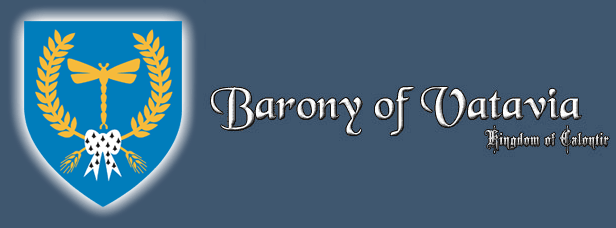
Birthdays
by His Lordship Friar Thomas Bacon (David Moreno)
Orignally published in the March 2006, A.S. XLI issue of the Dragonflyre, a publication of the Barony of Vatavia.
This year, on May 1st, we celebrate the 40th anniversary of the founding of the Society of Creative Anachronism. What had started as an end of the academic year going away party has blossomed into an international sport/hobby involving tens of thousands. Named on a whim to satisfy a bureaucratic requirement, the SCA has become the most widespread organization involved in medieval studies.
The SCA did not invent historical recreation. During the High Middle Ages knights would gather in tournaments called Arthurian Roundtables to recreate their ideas of Arthurian times. In 1839 an English Earl staged his own version of a tournament. Several more would be staged in Europe before the First World War. Since 1866 Maryland has held a form of jousting tournament. In 1962 it came the state sport.
Nor is the SCA the only recreationist group as there are groups doing the same thing for the mountain man era, the Civil War, the Wild West, and more recently, the Second World War. Nor is it the only group dealing with the Middle Ages and the Renaissance. Nor is it the most authentic.
What sets the SCA apart is its ability to meld together various paradoxes. It promotes the values and ideals of an earlier age, yet tolerates lifestyles that would have horrified the original practitioners of those values and ideals. It participants have a strong strain of disdain of authority and convention, yet work within the most authoritative framework. It gives its highest awards for historical authenticity, yet routinely overlooks intrusions of the 21st century. It has Vikings fighting Samurai in 15th century styled tournaments.
What makes it work is the general willingness to allow each to get out of the game what they want. There is no high bar that people must meet to play. People contribute what they can however little or much that may be.
Twenty years ago there was a great celebration of the twentieth anniversary of the Society. At that time the founders expressed their amazement over the growth and endurance of their little get togethers. One can only imagine their astonishment now.
Not that there has not been difficulties along the way. There was also a great debate twenty years ago over the direction of the Society. Over the relative importance of fighting and the arts. Over the award structures. Over the role the legal corporation, the independence of kingdoms. Even the size of kingdoms. Many groups have wreaked on similar shoals, yet the Society managed to navigate pass them because those in charge had the wisdom not to over react.
Also on May 1st, we celebrate the 27th anniversary of the founding of Vatavia. (The application for group status is actually dated May 15, while the initial organizing meetings occurred in April, May 1st just nicely coincides with the Society’s birthday.) And it was 25 years ago this past February that Vatavia was declared a barony. And just as the founders of the Society were amazed over the growth of their creation, so have been the founders of Vatavia.
Vatavia has had its own ups and downs, but has also endured. Few are the faces of a quarter of a century ago are seen today, yet the traditions remain. There are those who would casually toss those traditions, and those who would fiercely hold on to them, both miss the point. Traditions are what connect us to the past, but they should be allowed to strangle the group. And while it may not seem that way to those who follow, there are always reasons why traditions were started. While conditions change and those reasons may no longer be valid, it is foolhardy to assume that is the case. We must always remember that the central conceit of the Society is to relive the past, and traditions are what make the past live.
That is not to say nothing has change, for much has changed, much has remained the same. Armour has become more realistic and safer. Garb better reflects the fashions of that long ago time. And we have a finer understanding of how they practiced their crafts. Yet the structure and flow of events remain largely unchanged as does the pageantry. And all the changes in faces, inter-personal dynamics are universal.
What the coming years have for the Society is hidden from sight. But having survived the tumultuous years of its youth, there is no reason not to believe that the Society will last as long as there are people interested in history. For that is what ultimately attracts and holds people to the Society. Birthdays are celebrations of the achievements of the past year. But they should be also a time of reflection of what is to be achieved. They are milestones of how far we have come, and how far we have to go. Forty years of existence is a remarkable achievement of any operation, as most die within five years. Here’s to the next decades of the Society!
Copyright © 1997 - present His Lordship Friar Thomas Bacon (David Moreno). All rights reserved.